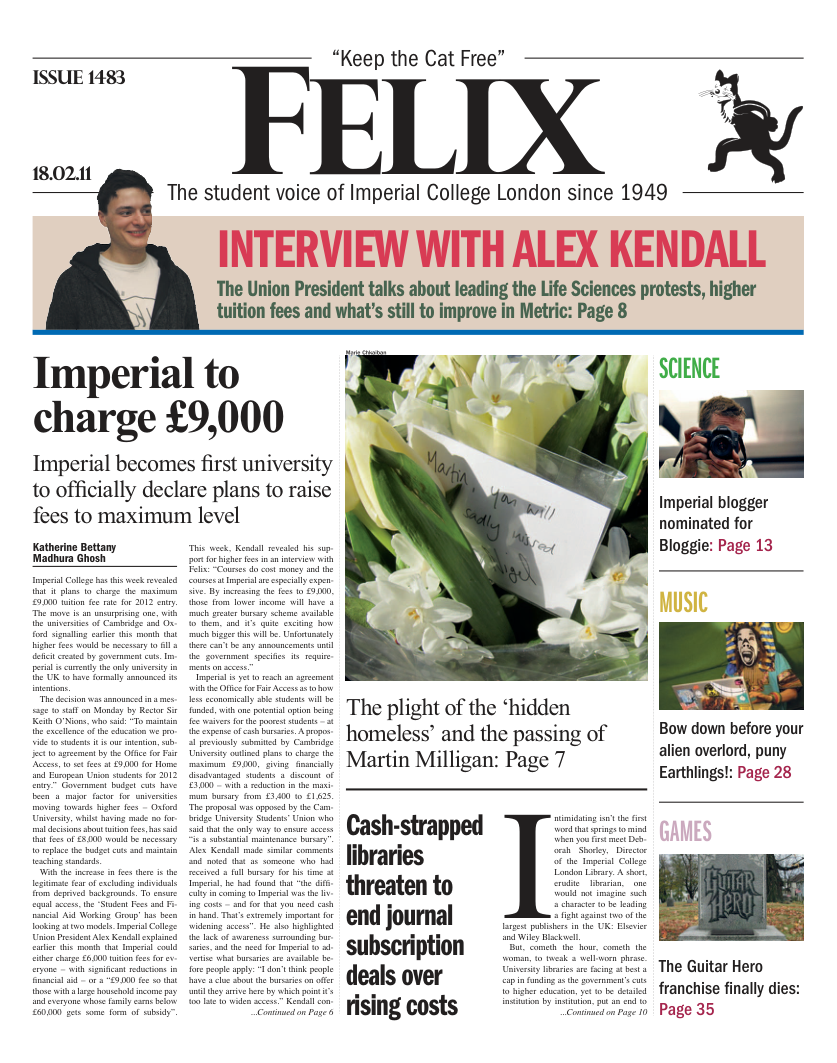Cash-strapped libraries threaten to end journal subscription deals over rising costs
Deborah Shorley, Head of Imperial’s library, will take Britain’s biggest publishers to the edge if necessary

Intimidating isn’t the first word that springs to mind when you first meet Deborah Shorley, Director of the Imperial College London Library. A short, erudite librarian, one would not imagine such a character to be leading a fight against two of the largest publishers in the UK: Elsevier and Wiley Blackwell.
But, cometh the hour, cometh the woman, to tweak a well-worn phrase. University libraries are facing at best a cap in funding as the government’s cuts to higher education, yet to be detailed institution by institution, put an end to the spending of the last decade – a period which now by comparison seems like a golden age. At the same time, publishing companies continue to make large profits. From 2005-2009 Elsevier’s profits increased from around £1 billion to £1.6 billion. Libraries have been locked into so-called “big deals” with these publishers. Their 3-year subscription deals offer their researchers instant access to thousands of journals but have tied libraries into 6% price increases year-on-year.
The pressure for libraries to reduce costs has become irresistible – “the fact is that we don’t have money in the sector and we can’t afford to go on spending as we have,” says Deborah. With journal subscriptions taking up a significant chunk of library spending – Imperial spends £3.8 million each year on journal subscriptions (out of a total library budget of £8.9 million) – there is no question, in Deborah Shorley’s opinion, as to where the savings need to be made: publishers need to cut their prices.
I will not blink Deborah Shorley
So leads us to the remarkable story of Imperial College’s self-effacing head librarian, pitted in a battle of nerves against the publisher of titles like the Lancet. She is leading Research Libraries UK (RLUK), which represents the libraries of Russell Group universities, in a public campaign to pressure big publishers to end up-front payments, to allow them to pay in sterling and to reduce their subscription fees by 15%. The stakes are high, library staff and services are at risk and if an agreement or an alternative delivery plan is not in place by January 2nd next year, researchers at Imperial and elsewhere will lose access to thousands of journals. But Deborah Shorley is determined to take it to the edge if necessary: “I will not blink.”
Pre-2000, university libraries would subscribe to individual journal titles. They would take a discerning look at the journals on offer and purchase only those that they explicitly desired. The primary mode of delivery was print but at the Internet took bold strides forward and publishers invested time and money developing software that would allow researchers to access papers and journals at the click of a button, a new age of the “big-deal” was born. Publishers offered access to thousands of journals – including back-issues, meticulously and expensively digitized back to volume one, issue one – at a marginally higher cost. Where before libraries would subscribe to a few hundred journals, their researchers now had access to thousands.
But prices soon began to rise. The bulk deals would include an approximate 6% price increase year-on-year, well above inflation. Why did libraries accept these increases? David Prosser, Executive Director of RLUK, says that libraries didn’t have much choice: “In the past the researchers have been saying to us that they need access to this material, so pay for it. We had to pull out all the stops to meet the demand and because we could find the money to pay, we did.” Publishers have defended the rises by pointing to the increased volume of articles that publishers provide, about 3% each year says a spokesman for the Publishing Association (PA) – Elsevier declined to comment while Wiley Blackwell had not responded to questions by the time of print. Include inflation with the increased volume of articles, the PA argues, and the 6% price increase is entirely reasonable. However, an institution like Imperial now accesses journals entirely electronically, which means that though the volume of articles increases by 3%, the associated costs do not.
This isn’t the first time that big publishers have faced these sorts of criticisms. In June 2010, the University of California (UC) threatened to boycott the Nature Publishing Group, which you could have guessed publishes Nature, after they tried to increase the cost of their subscription by a whopping 400%. In a letter to its faculties, UC accused them of being “unresponsive to the [financial] plight of libraries” and urged its researchers to boycott the publisher if necessary by declining to peer review or edit for journals owned by the Nature Publishing Group or even submit their papers to them. The letter spoke of the need to “break the monopoly that commercial and for profit entities like NPG hold over the work that we create”. The dispute was eventually resolved amicably but UC’s comments were echoed by Robert Darnton, the Director of Harvard University Library, who in December 2010 called for the “monopolies of price-gouging publishers […] to be broken.”
Publishing companies can, by purchasing the major journals in an area of research, own a monopoly in certain research topics. However, the Publishing Association reject the accusation and say that publishing companies operate in a market and that researchers have a choice as to where to publish their papers and that libraries are free to negotiate on price. Deborah Shorley points out that their contracts are subject to non-disclosure agreements meaning that they can’t compare prices with other universities: “Which means that you’re negotiating with one hand tied behind your back.”
These are very difficult times, and we will work with [libraries] Elsevier
The alternatives to reducing the cost of major subscriptions are quite unpalatable. Subscriptions to smaller publishers and learned societies could be the first to go. But ultimately resources must be protected says Deborah Shorley. The result of this, which she admits is controversial, is that library staff are vulnerable to redundancy: “If I protect the staff but not resources, it leaves no resources for staff to provide.” David Prosser claims that publishers want libraries to cut staff in order to be able to afford the subscriptions: “The Publishing Association has told us that we should be saving money by sacking people. It’s completely unimaginable for them to reduce their costs.” However, the PA told Felix that it is for libraries to decide how to balance their books and, publicly at least, Elsevier has appeared sympathetic to library budget constraints, telling the Wall Street Journal last November: “These are very difficult times, and we will work with [libraries].”
In the middle of these high-level negotiations, both public and private, are the researchers, who of course don’t pay for their consumption; when the cost is zero, demand is infinite. RLUK is searching for an alternative to the current arrangement with big publishers. They are developing a contingency plan which will allow them to walk away from the publishers while reassuring academics that their research won’t suffer. A “world expert in document supply”, as Deborah Shorley refers to him, is developing the contingency plan at Imperial. The plan will involve purchasing the must-have, high-use journals individually (research has shown that 5% of journals account for 40% of journal subscription use) and supplying other papers through document supply, which means that researchers are able to read an abstract and request delivery of the paper, commonly from the British Library. Delivery times for document supply can be less than two hours electronically. Additionally, 10% of the material that libraries receive through paid subscriptions is already available through open-access. Deborah Shorley is keen to work with researchers, to help them avoid disruption if the contingency plan is needed, “At the beginning of the next academic year, we’ll be offering very practical help to researchers so that they are as unaffected as possible.” The PA is sceptical about RLUK’s ability to replicate the service that publishers currently provide, which Deborah Shorley admits will be difficult. However, she argues that they will be able to go a long way to matching it and that any short-term pain will be for long-term gain, “we want researchers to be on board to understand this is worth it in the long term.” She stressed that ideally they would not have to resort to the contigency plan.
Still, the libraries are adamant that they won’t back down from their demands. The key, however, to the struggle is how researchers respond to the debate. If they can be convinced that rising journal costs are threatening to compromise research in the long-term and that the contingency plan will allow them to continue their work without much disruption, then the pressure on the publishers will be overwhelming. But if researchers demand access to journals, whatever the cost, libraries will be between a rock and a hard place. The fight for the hearts and minds of academics is crucial.








